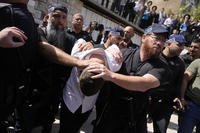
I've been trolling around trying to find some inside dope and analysis on the comparison of how Georgia's troops have handled the Russian invasion and how Russian troops have stacked up against Georgia's U.S.-trained forces.
So far, the best one I can find is a blog entry from the New York Times authored by an experienced Russian expert who speaks a lot more Russian than me and delved into two separate Russian blogs that have some unique analysis.
In an interview posted on the Kreml.org Web site yesterday, Anatoly Tsyganok, a retired officer who heads the center for military forecasting at the Moscow Institute of Political and Military Analysis, argued that Russian forces had performed impressively quickly and extraordinarily well.
But in an article carried on the anti-Kremlin Web site Forum.msk.ru, Maksim Kalashnikov, who writes frequently on military affairs, suggests that the Russian militarys performance in this first war between former Soviet republics and in the first Russian conflict with a regular army since 1969 was not impressive.
For his part, Tsyganok points to three things to justify his conclusion that the Russian military prepared well. First, he says, the Georgians had a good plan, one based on Pentagon plans for operations in Serbia in the 1990s, and thus presented a challenge to Russian forces out of proportion to their numbers.
Second, he notes, the Russian military responded quickly. No one expected that Russia would so quickly become involved in an armed conflict between Georgia and South Ossetia and thereby undercut Georgian plans for a lightning-fast war. But political Moscow made the decision and the Russian military responded incredibly fast...
...And third, again despite expectations in Tbilisi and elsewhere, Russian forces in the Northern Caucasus were ready to move. They left their bases less than five hours after the order was given, and they did not suffer the kind of losses many in Georgia had thought they would. They achieved their objectives promptly.
One reason for this success, Tsyganok says, is that the 58th Army had just completed a few days earlier the Caucasus 2008 exercises and thus was ready to take the field especially against an opponent so much smaller and more poorly equipped than itself.
There are more than 100,000 Russian troops in the North Caucasus military district, with some 620 tanks, 200 armored personal carriers, and 875 pieces of artillery. While not all of the men or materiel were available for the operation in Georgia, he notes, enough were to overwhelm the 35,000-man Georgian army with its 160 tanks.
It's a typical Russian/Soviet version of "shock and awe," but I read some quotes from another article with Russian troops wondering aloud if what they were doing was "right." Aside from the morale issues in the Russian army, it seems there's been some weakness in its tactical acumen. While they pulled out the big guns by streaming reactive armor-laden tanks through Georgian streets, their air forces couldn't seem to pinpoint certain strategic targets. Remember they tried to bomb the pipeline at a Georgian Black Sea port and missed.
Kalashnikov [the anti-Kremlin blogger] does not so much challenge the points Tsyganok makes as advances other considerations that he believes suggest that the Russian militarys performance in Georgia, while victorious so far, is far from the level that Moscow propagandists and many observers have been claiming.
According to Kalashnikov, Moscow has had six years to prepare for a response to or an intervention against Georgia but did practically nothing to get ready for either eventuality. Nowhere is that failure more obvious, he says, than in the failure of Russian forces to use air power to knock out key Georgian institutions and especially Georgian artillery.
The Russian forces did not fly a sufficient number of sorties to do either, he continues, and they lacked the pilotless drones that could have allowed Russian artillery to attack Georgian targets more effectively. And that meant that Russian forces suffered more delay and losses from Georgian artillery than was necessary.
Instead of relying on airport to deal a knockout blow to the enemy, Kalashnikov says, Russian commanders relied on the notion that if Moscow introduces tanks in sufficient number, the opposition will simply raise its hands in surrender even though that did not work in Afghanistan in the 1980s or in Chechnya in 1995.
We'll see if the current "cease fire" is for real. Seems like the West is in a bind on this one and it might turn out to be a political setback for former Soviet states who want to join NATO. What would NATO do? Nothing, I bet.
-- Christian








